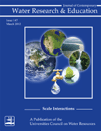
Journal of Contemporary Water Research & Education
Scope & Guideline
Fostering Collaboration in Water Research and Education
Introduction
Aims and Scopes
- Water Quality and Pollution Management:
The journal emphasizes research on water quality assessment, pollution sources, and mitigation strategies. This includes studies on harmful algal blooms, microplastics, and the impact of urbanization on water bodies. - Water Resource Management and Policy:
A core focus is on the management and policy implications surrounding water resources, including irrigation practices, community water needs, and regulatory frameworks. - Education and Outreach:
The journal supports educational initiatives aimed at improving public understanding and engagement in water-related issues, with a particular emphasis on youth education and community science. - Interdisciplinary Research:
The publication encourages interdisciplinary approaches, integrating perspectives from hydrology, environmental science, sociology, and education to tackle complex water challenges. - Technological Innovations in Water Monitoring:
Research on the application of technological advancements, such as remote sensing and drone technology, for monitoring and managing water quality and resources is a significant area of interest.
Trending and Emerging
- Community Engagement and Citizen Science:
There is a growing emphasis on involving the public in water quality monitoring and management through community science initiatives, recognizing the importance of local knowledge and participation. - Impact of Climate Change on Water Resources:
Research focusing on the effects of climate change on water availability, quality, and management practices is increasingly prominent, reflecting the urgency of adapting to changing environmental conditions. - Diversity, Equity, and Inclusion in Water Issues:
The journal is increasingly addressing themes of diversity, equity, and inclusion within water dialogues, highlighting the need for diverse perspectives in water management and policy. - Innovative Water Treatment and Technology:
There is a notable trend towards exploring innovative technologies for water treatment and monitoring, including the use of drones and remote sensing, indicating a shift towards high-tech solutions. - Health Impacts of Water Quality:
Research on the public health implications of water quality, particularly in relation to pollutants and contaminants, is gaining traction, emphasizing the intersection of water management and public health.
Declining or Waning
- Traditional Agricultural Water Management:
Research specifically centered on conventional agricultural practices and their water management is becoming less frequent, likely due to a growing interest in sustainable and innovative agricultural practices. - Historical Water Policy Analysis:
There is a noticeable decrease in papers addressing historical perspectives on water policy, potentially indicating a shift towards more contemporary, actionable policy discussions. - Single-Discipline Studies:
The journal seems to be moving away from studies that focus solely on one discipline, as interdisciplinary research is gaining traction, reflecting the complexity of water issues. - Local Case Studies without Broader Implications:
While local case studies are still published, there is a trend towards those that connect to broader themes or have implications for wider regions, suggesting a waning interest in isolated studies.
Similar Journals
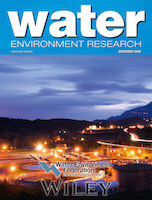
WATER ENVIRONMENT RESEARCH
Championing rigorous research for a sustainable water world.WATER ENVIRONMENT RESEARCH is a leading scholarly journal dedicated to disseminating cutting-edge research in the fields of water science and technology. Published by WILEY, this esteemed journal (ISSN: 1061-4303; E-ISSN: 1554-7531) is renowned for its rigorous peer-reviewed articles that explore critical issues related to ecological modeling, environmental chemistry, pollution, and waste management. Established in 1992 and continuing through 2024, WATER ENVIRONMENT RESEARCH has secured a notable position within its category quartiles, ranking in the Q2 tier for several disciplines, including ecological modeling and water science and technology. It is highly regarded in the Scopus database, holding a rank of #53 out of 261 journals in Environmental Science related to Water Science and Technology, positioning it in the 79th percentile. As it continues to bridge research and practice, this journal serves as an essential resource for researchers, professionals, and students striving to advance knowledge and foster sustainable solutions within the water environment sector.
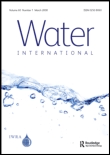
WATER INTERNATIONAL
Catalyzing Change for a Sustainable Water FutureWATER INTERNATIONAL is a leading journal in the realms of water science and policy, published by Routledge Journals, Taylor & Francis Ltd. With its ISSN 0250-8060 and E-ISSN 1941-1707, the journal has maintained a robust scholarly presence since its inception in 1975, with contributions focused on management, monitoring, and policy pertaining to water resources. Currently convening from 1975 to 2024, WATER INTERNATIONAL is recognized for its significant impact, reflected in its Q2 category rankings within Environmental Science sectors—ranked #157/399 in Management, Monitoring, Policy and Law, and #103/261 in Water Science and Technology. The absence of an open access option does not diminish its importance, as it continues to serve as a crucial platform for interdisciplinary researchers, professionals, and students aiming to address the challenges surrounding water governance and sustainability. With its focus on innovative methodologies and policy-oriented research, the journal stands at the forefront of advancing knowledge in water resource management.
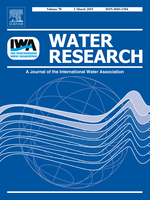
WATER RESEARCH
Elevating knowledge in water sustainability and management.WATER RESEARCH, published by Pergamon-Elsevier Science Ltd, is a premier international journal dedicated to the advancement of knowledge in the interdisciplinary field of water science and technology. With a significant impact factor, WATER RESEARCH holds a distinguished position, consistently ranking in the top quartile (Q1) across multiple categories including Civil and Structural Engineering, Environmental Engineering, and Pollution. Established in 1967 and set to continue its legacy until at least 2024, this journal provides a vital platform for researchers and professionals to disseminate cutting-edge findings related to water sustainability, quality, and management. Although the journal follows a traditional access model, its commitment to disseminating impactful research ensures that it remains an essential resource for academia and industry alike. With a rigorous selection process, the journal includes articles that significantly contribute to the understanding and resolution of global water-related challenges, making it an invaluable asset for researchers, students, and practitioners engaged in this critical area of study.
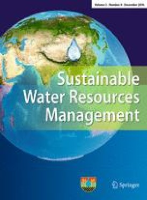
Sustainable Water Resources Management
Advancing sustainable solutions for global water challenges.Sustainable Water Resources Management is an esteemed journal focusing on the critical field of water resource management in the context of sustainability. Published by Springer International Publishing AG, this journal serves as a vital platform for researchers, policymakers, and practitioners to disseminate cutting-edge research and innovative practices aimed at addressing global water challenges. With an impressive impact factor aligned with its Q2 ranking in Water Science and Technology and Q3 in Renewable Energy, Sustainability, and the Environment, it maintains a robust reputation in its field, evidenced by its Scopus rankings. Covering a diverse range of topics from integrated water resource management to the nexus between water and energy, Sustainable Water Resources Management is committed to fostering knowledge exchange and encouraging interdisciplinary dialogue among its audience. This journal, operating under strict academic rigor, plays an essential role in advancing sustainable practices and is open from 2015 to 2024, making it a relevant resource in today’s rapidly evolving environmental context.
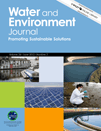
WATER AND ENVIRONMENT JOURNAL
Shaping sustainable practices through rigorous research.WATER AND ENVIRONMENT JOURNAL is a prominent interdisciplinary journal dedicated to the latest research and advancements in the fields of water resources, environmental engineering, and pollution management. Published by WILEY, the journal has established itself as an essential resource for academics, practitioners, and policymakers since its inception in 1987. With an impressive impact factor reflecting its robust influence, it ranks in the Q2 and Q3 quartiles across multiple categories, including Water Science and Technology, Environmental Engineering, and Management, Monitoring, Policy and Law. The journal welcomes high-quality research articles, reviews, and case studies that address the critical challenges facing water and environmental sciences. As an open access publication, it provides a platform for widespread accessibility and engagement, ensuring that the knowledge generated is disseminated to a diverse audience. With a commitment to advancing understanding and solutions in water-related issues, WATER AND ENVIRONMENT JOURNAL plays a crucial role in shaping the future of environmental research and technology.
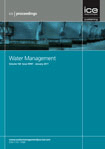
PROCEEDINGS OF THE INSTITUTION OF CIVIL ENGINEERS-WATER MANAGEMENT
Exploring Innovations in Civil Engineering Water PracticesPROCEEDINGS OF THE INSTITUTION OF CIVIL ENGINEERS-WATER MANAGEMENT is a prestigious journal published by Emerald Group Publishing Ltd, dedicated to advancing the field of water management within civil engineering. With an ISSN of 1741-7589 and an E-ISSN of 1751-7729, this journal delivers peer-reviewed research that spans the critical intersections of water science and technology, contributing valuable insights into sustainable water management practices. As evidenced by its ranking in the 2023 Scopus categories, where it holds the Q3 quartile in Water Science and Technology, and a respectable position among its peers, the journal remains a vital resource for researchers, professionals, and students in the field. Though it is not an open-access journal, it offers accessible subscription options that facilitate worldwide dissemination of knowledge, enhancing its role as a fundamental reference point for cutting-edge developments in water management. For those looking to publish or stay updated on the latest research trends, this journal serves as an essential platform for promoting innovation and sustainable practices in civil engineering and water resources management.

Water Conservation Science and Engineering
Advancing Sustainable Solutions for Water PreservationWater Conservation Science and Engineering, published by SPRINGERNATURE, is a vital academic journal dedicated to advancing the fields of environmental engineering, ocean engineering, waste management, and water science and technology. Since its inception in 2016, the journal has quickly established itself within the academic community, achieving a commendable Q3 ranking across multiple categories in 2023. With an ISSN of 2366-3340 and an E-ISSN of 2364-5687, it is accessible to a global readership eager to explore the latest research and innovations in water conservation and sustainable practices. Although currently not open access, the journal is committed to publishing high-quality scholarly articles that provide insights into effective water management strategies, innovative engineering solutions, and the critical importance of preserving our water resources. Based in Singapore, Water Conservation Science and Engineering aims to foster interdisciplinary collaboration among researchers, professionals, and students, making it an essential resource for anyone passionate about environmental sustainability and preservation.

RBRH-Revista Brasileira de Recursos Hidricos
Innovating Solutions for Global Water ChallengesRBRH-Revista Brasileira de Recursos Hidricos is a leading peer-reviewed journal dedicated to the dissemination of high-quality research in the field of water resources, published by the Associação Brasileira de Recursos Hídricos (ABRH). With both ISSN 1414-381X and E-ISSN 2318-0331, this journal has established itself as an essential resource since its transition to Open Access in 1996, fostering widespread accessibility to vital research findings. Based in Brazil, the journal serves a global audience, embodying a commitment to the study and management of aquatic systems, including their dynamics and technological solutions. As part of its rigorous academic contributions, it has achieved Q3 rankings across categories such as Aquatic Science, Earth-Surface Processes, Oceanography, and Water Science & Technology, reflecting its impact and relevance in these domains. Researchers, professionals, and students are encouraged to engage with the journal's diverse array of studies from 2016 to 2024, consolidating knowledge on crucial water resource challenges and innovations.
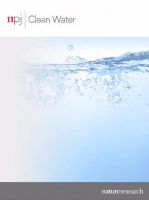
npj Clean Water
Transforming water challenges into actionable insights.npj Clean Water, published by NATURE PORTFOLIO, is a premier open-access journal dedicated to advancing the field of water science and technology. Since its launch in 2018, this innovative publication has quickly established itself as a leading platform for original research and policy discussions concerning clean water access and quality. With an impressive impact factor and categorized in the Q1 Quartile across multiple environmental science disciplines—including management, monitoring, pollution, and waste management—npj Clean Water stands out for its rigorous peer-review process and commitment to disseminating high-quality research. Researchers, professionals, and students involved in water-related challenges will find invaluable insights that address critical environmental issues and promote sustainable practices. Access to articles is freely available, encouraging global collaboration and knowledge sharing within the water sector. This journal embodies a significant step towards achieving innovation and policy advancements in the pursuit of a cleaner, safer water future.

Asian Journal of Water Environment and Pollution
Fostering impactful discussions on water pollution management.Asian Journal of Water Environment and Pollution is a leading academic journal published by IOS PRESS, dedicated to advancing the field of water science and technology, as well as pollution management. With its ISSN 0972-9860 and E-ISSN 1875-8568, this journal serves as a pivotal platform for researchers, professionals, and academics alike who are keen to explore innovative solutions and interdisciplinary approaches toward water-related challenges and environmental issues. Although currently positioned in the Q4 category for both pollution and water science & technology, the journal aims to foster impactful research and discussions that can enhance the understanding and treatment of water pollution. The Asian Journal of Water Environment and Pollution not only plays a crucial role in disseminating knowledge but also encourages the sharing of findings from unique geographic perspectives, particularly from Asia. As the field evolves, this journal is poised to become a vital resource for those looking to contribute to sustainable water management practices and pollution reduction strategies.